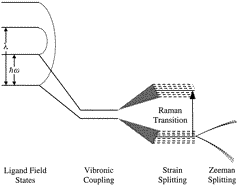Abstract of Publication No. 402
 P. L. W. Tregenna-Piggott and Hans-Ueli Güdel
P. L. W. Tregenna-Piggott and Hans-Ueli Güdel
Influence of Jahn-Teller Coupling on the Magnetic Properties of Transition Metal Complexes with Orbital
Triplet Ground Terms: Magnetization and Electronic Raman Studies of the Titanium(III) Hexa-Aqua Cation
Inorg. Chem. 40, 5497-5506 (2001)
![]()
![]()
Abstract:
Magnetization and electronic Raman data are presented for salts of the
type Cs[Ga:Ti](SO4)2·12H2O, which enable
a very precise definition of the electronic structure of the [Ti(OH2)6]3+
cation. The magnetization data exhibit a spectacular deviation from
Brillouin behavior, with the magnetic moment highly dependent on the
strength of the applied field at a given ratio of B/T. This
arises from unprecedented higher-order contributions to the magnetization,
and these measurements afford the determination of the ground-state Zeeman
coefficients to third-order. The anomalous magnetic behavior is a
manifestation of Jahn-Teller coupling, giving rise to low-lying vibronic
states, which mix into the ground state through the magnetic field.
Electronic Raman measurements of the 1%-titanium(III)-doped sample
identify the first vibronic excitation at ~18 cm–1, which
betokens a substantial quenching of spin-orbit coupling by the vibronic
interaction. The ground-state Zeeman coefficients are strongly dependent
on the concentration of titanium(III) in the crystals, and this can be
modeled as a function of one parameter, representing the degree of strain
induced by the cooperative Jahn-Teller effect. This study clearly
demonstrates the importance that the Jahn-Teller effect can have in
governing the magnetic properties of transition metal complexes with
orbital triplet ground terms.